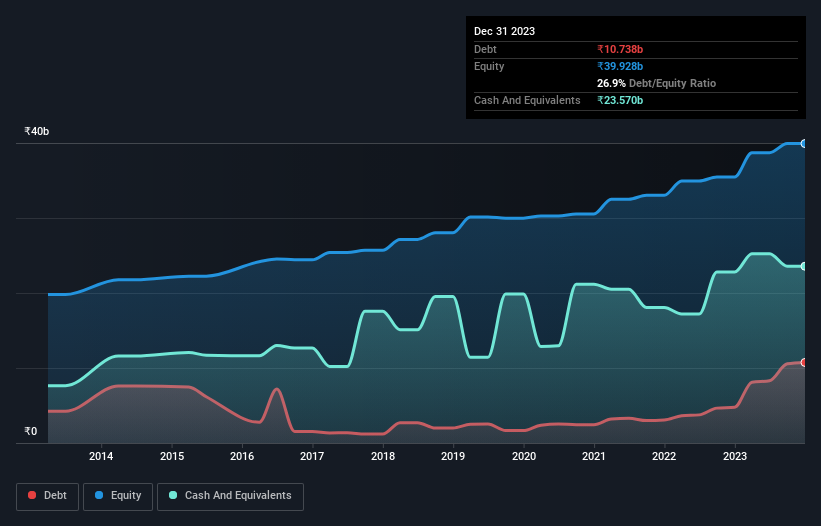
Howard Marks put it nicely when he said that, rather than worrying about share price volatility, 'The possibility of permanent loss is the risk I worry about... and every practical investor I know worries about.' It's only natural to consider a company's balance sheet when you examine how risky it is, since debt is often involved when a business collapses. We note that Thermax Limited (NSE:THERMAX) does have debt on its balance sheet. But the more important question is: how much risk is that debt creating?
When Is Debt Dangerous?
Debt is a tool to help businesses grow, but if a business is incapable of paying off its lenders, then it exists at their mercy. Ultimately, if the company can't fulfill its legal obligations to repay debt, shareholders could walk away with nothing. However, a more common (but still painful) scenario is that it has to raise new equity capital at a low price, thus permanently diluting shareholders. Having said that, the most common situation is where a company manages its debt reasonably well - and to its own advantage. The first thing to do when considering how much debt a business uses is to look at its cash and debt together.
See our latest analysis for Thermax
What Is Thermax's Debt?
As you can see below, at the end of September 2023, Thermax had ₹10.7b of debt, up from ₹4.78b a year ago. Click the image for more detail. However, it does have ₹23.6b in cash offsetting this, leading to net cash of ₹12.8b.

A Look At Thermax's Liabilities
According to the last reported balance sheet, Thermax had liabilities of ₹44.8b due within 12 months, and liabilities of ₹8.36b due beyond 12 months. Offsetting these obligations, it had cash of ₹23.6b as well as receivables valued at ₹18.6b due within 12 months. So it has liabilities totalling ₹11.0b more than its cash and near-term receivables, combined.
Of course, Thermax has a market capitalization of ₹439.1b, so these liabilities are probably manageable. However, we do think it is worth keeping an eye on its balance sheet strength, as it may change over time. Despite its noteworthy liabilities, Thermax boasts net cash, so it's fair to say it does not have a heavy debt load!
On top of that, Thermax grew its EBIT by 54% over the last twelve months, and that growth will make it easier to handle its debt. When analysing debt levels, the balance sheet is the obvious place to start. But it is future earnings, more than anything, that will determine Thermax's ability to maintain a healthy balance sheet going forward. So if you're focused on the future you can check out this free report showing analyst profit forecasts.
Finally, a company can only pay off debt with cold hard cash, not accounting profits. While Thermax has net cash on its balance sheet, it's still worth taking a look at its ability to convert earnings before interest and tax (EBIT) to free cash flow, to help us understand how quickly it is building (or eroding) that cash balance. Over the last three years, Thermax recorded negative free cash flow, in total. Debt is far more risky for companies with unreliable free cash flow, so shareholders should be hoping that the past expenditure will produce free cash flow in the future.
Summing Up
We could understand if investors are concerned about Thermax's liabilities, but we can be reassured by the fact it has has net cash of ₹12.8b. And we liked the look of last year's 54% year-on-year EBIT growth. So we don't have any problem with Thermax's use of debt. Over time, share prices tend to follow earnings per share, so if you're interested in Thermax, you may well want to click here to check an interactive graph of its earnings per share history.
At the end of the day, it's often better to focus on companies that are free from net debt. You can access our special list of such companies (all with a track record of profit growth). It's free.
Valuation is complex, but we're here to simplify it.
Discover if Thermax might be undervalued or overvalued with our detailed analysis, featuring fair value estimates, potential risks, dividends, insider trades, and its financial condition.
Access Free AnalysisHave feedback on this article? Concerned about the content? Get in touch with us directly. Alternatively, email editorial-team (at) simplywallst.com.
This article by Simply Wall St is general in nature. We provide commentary based on historical data and analyst forecasts only using an unbiased methodology and our articles are not intended to be financial advice. It does not constitute a recommendation to buy or sell any stock, and does not take account of your objectives, or your financial situation. We aim to bring you long-term focused analysis driven by fundamental data. Note that our analysis may not factor in the latest price-sensitive company announcements or qualitative material. Simply Wall St has no position in any stocks mentioned.
About NSEI:THERMAX
Thermax
Provides energy, environment, and chemical solutions in India and internationally.
Excellent balance sheet average dividend payer.
Similar Companies
Market Insights
Community Narratives



